Feeling tired and wondering why your newborn doesn’t sleep through the night? You’re not alone. Many new parents face baby sleep problems due to common mistakes. Fixing these issues can be tough, but the right steps can help your baby sleep better.
What if the solution to these problems is understanding their causes? Instead of just treating symptoms, we should look at the root of the issue.
Key Takeaways
- Identifying common newborn sleep mistakes is key to fixing issues.
- Knowing what newborns need for sleep is vital for a good sleep environment.
- Fixing sleep problems requires a full approach, including a sleep-friendly space and teaching self-soothing.
- Baby sleep issues can be solved by tackling problems like irregular bedtime routines and sleep cycle differences.
- Avoiding newborn sleep mistakes means being aware of common pitfalls and taking steps to prevent them.
- Fixing sleep issues greatly benefits both the baby and the parents’ well-being.
- By being proactive and informed, you can help your newborn develop healthy sleep habits and overcome sleep problems.
Understanding Your Newborn’s Sleep Needs
As a new parent, knowing your newborn’s sleep needs is key. Newborns sleep differently, and it’s important to understand these patterns. This helps avoid mistakes and helps your baby sleep well.
Newborns sleep in short cycles and wake up often. They’re adjusting to the world and need to eat and change a lot. Learning about their sleep helps you spot and fix problems that can keep them awake.
Here are some important things to remember about your newborn’s sleep:
- Start a regular sleep routine to help your baby sleep better.
- Make their sleep space dark and quiet to help them sleep.
- Keep things calm to help your baby fall and stay asleep.
By understanding and meeting your newborn’s sleep needs, you can help them sleep well. This also helps you find the best ways to train your baby to sleep. It leads to better sleep for both you and your baby.
The Impact of Timing on Baby Sleep
When trying to improve your baby’s sleep, timing is key. A consistent sleep schedule can greatly enhance your baby’s sleep quality. A bedtime routine helps signal sleep time, aiding in healthy sleep patterns.
Timing factors for baby sleep include:
- Establishing a consistent sleep schedule
- Creating a bedtime routine with calming activities, like bath time or reading
- Watching for sleepy cues, such as yawning or rubbing their eyes
Adjusting to these factors can help your baby sleep well for life. Remember, every baby is different, so it may take some trial and error to find the right approach for your little one. With patience and persistence, your baby will learn to sleep well and thrive.
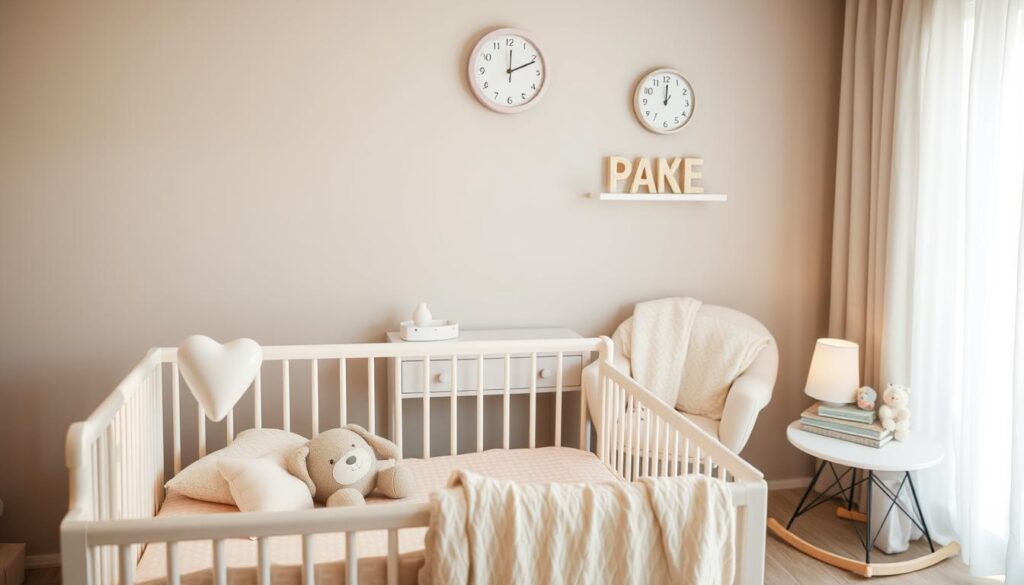
By focusing on timing and a consistent sleep routine, your baby gets the rest they need. This supports their growth and health, making it a vital part of improving baby sleep habits and newborn sleep tips.
| Age | Sleep Needs |
|---|---|
| Newborn (0-3 months) | 14-17 hours of sleep per day |
| Infant (4-11 months) | 12-15 hours of sleep per day |
Common Newborn Sleep Mistakes and How to Fix Them
As a new parent, you want your baby to sleep well. But, there are mistakes that can mess up their sleep. Knowing these mistakes and how to fix them is key. It takes patience and understanding to solve baby sleep problems.
Some common errors include keeping your baby up too long and having a random bedtime routine. Also, responding too fast to every sound can be a problem. But, there are ways to fix these issues. For instance, a consistent bedtime routine with a warm bath, reading, and singing can help your baby relax.

- Watch for sleepy cues, such as yawning or rubbing their eyes, to determine when your baby is tired.
- Establish a consistent sleep schedule and stick to it, even on weekends.
- Create a sleep-friendly environment, such as keeping the room dark, quiet, and at a comfortable temperature.
By knowing and fixing common newborn sleep mistakes, you can help your baby sleep better. This ensures they get the rest they need for growth and health.
| Common Newborn Sleep Mistakes | Solutions |
|---|---|
| Keeping baby awake too long | Establish a consistent sleep schedule |
| Inconsistent bedtime routines | Develop a calming pre-sleep routine |
| Responding too quickly to every sound | Give your baby time to self-soothe |
Creating the Optimal Sleep Environment
Creating a great sleep environment is key for your newborn’s sleep habits. It’s about making sure everything is just right for your baby to sleep well. Using the right techniques can help your baby sleep better and avoid sleep problems.
The room’s temperature and lighting are very important. A room that’s not too hot or cold helps your baby sleep. Also, a dark room helps keep their sleep cycle regular.
Temperature and Lighting Considerations
Keep the room’s temperature between 68-72°F (20-22°C) for your baby. Use curtains or blinds to control the light. This makes the room perfect for sleep, helping your baby sleep better and avoiding sleep issues.
Noise Level Management
Noise can affect your baby’s sleep too. White noise machines or a fan can help. They make a constant sound that blocks out other noises. This helps your baby sleep better and promotes healthy sleep habits.
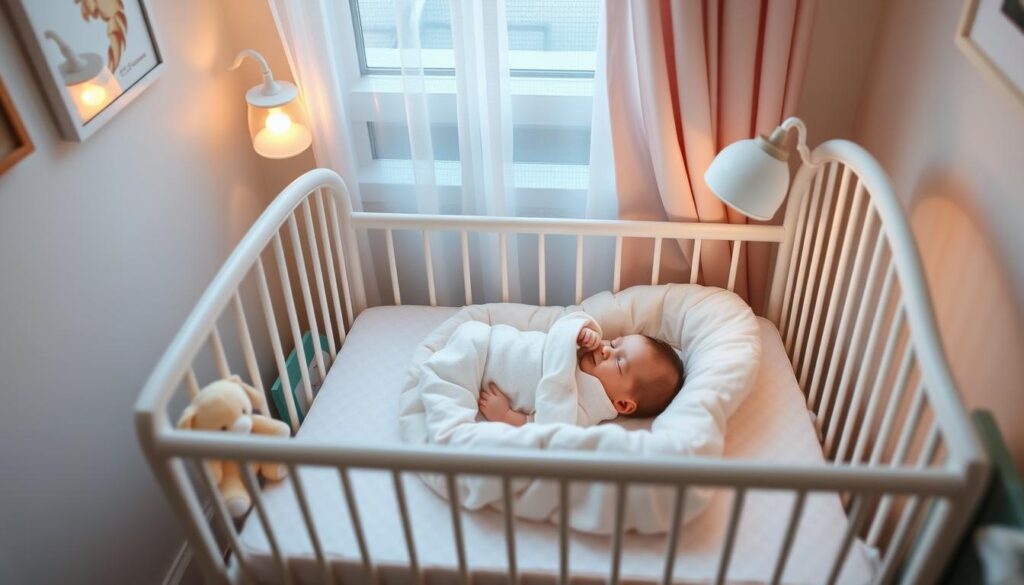
Safe Sleep Space Setup
Make sure your baby’s sleep area is safe and comfy. Use a firm mattress and keep the crib clear of soft toys and blankets. These steps help your baby sleep well and avoid sleep problems.
| Factor | Recommendation |
|---|---|
| Temperature | 68-72°F (20-22°C) |
| Lighting | Dark or dimly lit |
| Noise Level | Constant, soothing sound |
Feeding and Sleep Connection
Looking into ways to better your baby’s sleep? It’s key to see how feeding and sleep are linked. Studies show that a regular feeding schedule can really help with sleep. By setting up a routine that fits you and your baby, you can make their sleep better.
Here are some tips for a feeding schedule that helps with sleep:
- Watch for hunger signs to feed on demand
- Start a routine as your baby gets older
- Don’t overfeed or underfeed, as it can mess with sleep
Being aware of the feeding and sleep link is a big step towards better sleep for your baby. Every baby is different, so finding the right balance might take time. But with patience and consistency, your baby can learn healthy sleep habits. For more tips on newborn sleep, talk to your pediatrician or a healthcare expert.
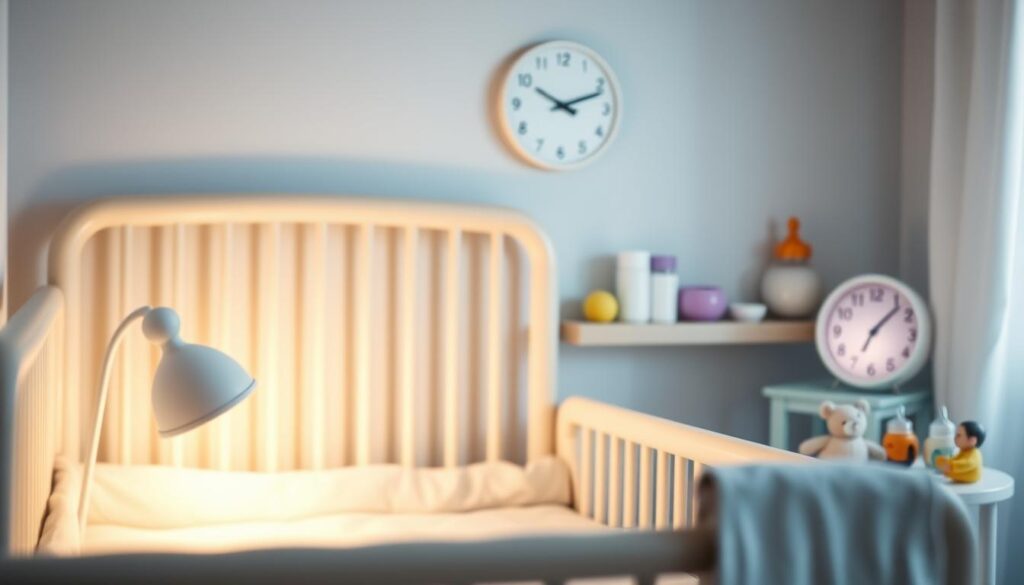
Remember, creating a good feeding and sleep routine takes time. It’s okay to change things as you go. With the right steps and patience, your baby can learn to sleep well and grow strong.
Establishing a consistent feeding schedule is key for better baby sleep habits and health.
The Role of Self-Soothing
As a new parent, you want your baby to sleep well from the start. Teaching your baby to self-soothe is key for sleep training for infants. This skill helps them sleep all night and avoid newborn sleep mistakes.
Self-soothing is important for newborns. It lets them sleep alone and through the night. This skill helps fix newborn sleep issues. To encourage self-soothing, give your baby time to calm down alone. Use white noise machines or swaddling for a cozy feel. Also, have a regular bedtime routine.
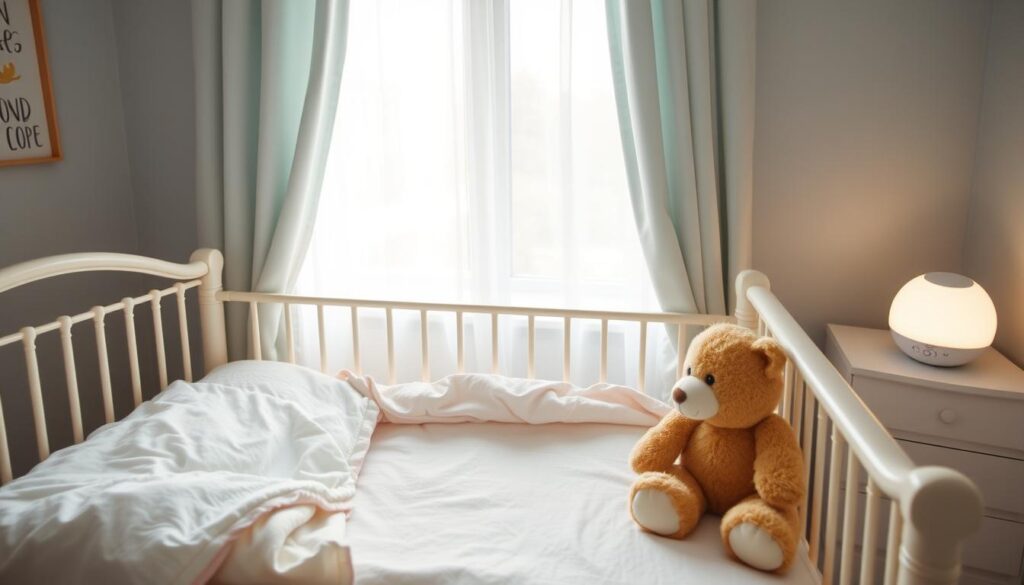
Teaching Independent Sleep Skills
Teaching your baby to self-soothe takes time and patience. Start by letting your baby settle down alone when upset. Slowly increase the time you leave them to calm down.
When to Start Sleep Training
You can start sleep training early, but wait until your baby is ready. Usually, this is around 4-6 months. At this age, they can tell day from night and have a regular sleep pattern.
Different Self-Soothing Methods
There are many ways to help your baby self-soothe, including:
- Swaddling: It makes your baby feel safe and comforted, helping them relax.
- White noise machines: They create a calm environment that aids in sleep.
- Rocking: Gentle rocking motions can be soothing and help your baby calm down.
Try different self-soothing methods and stick to them. This way, your baby can learn to sleep through the night and avoid newborn sleep mistakes.
Breaking Bad Sleep Associations
When you’re trying to correct newborn sleep patterns, it’s key to spot and break bad sleep habits. These habits can mess up your baby’s sleep and make it hard for them to sleep on their own. By improving baby sleep habits, you can help your newborn get into good sleep routines.
Feeding or rocking your baby to sleep is a common bad habit. It might make your baby fall asleep fast, but it can also make them rely too much on these actions. To fix this, try using newborn sleep tips like starting a bedtime routine. This could be a warm bath or a massage to calm them down.

By getting rid of bad sleep habits and improving baby sleep habits, you can help your newborn sleep better. Be patient and keep at it, as changing sleep habits takes time and effort. With the right steps and newborn sleep tips, your baby can learn healthy sleep habits for life.
Daytime Activities That Affect Nighttime Sleep
Understanding how daytime activities affect your baby’s sleep is key. Research shows that a mix of active and restful time during the day is important. This balance helps fix sleep patterns and avoids common mistakes in infant sleep.
Managing daytime naps is critical. Setting a consistent nap schedule helps your baby’s sleep-wake cycle. Also, natural light during the day helps regulate their circadian rhythms, leading to better nighttime sleep.
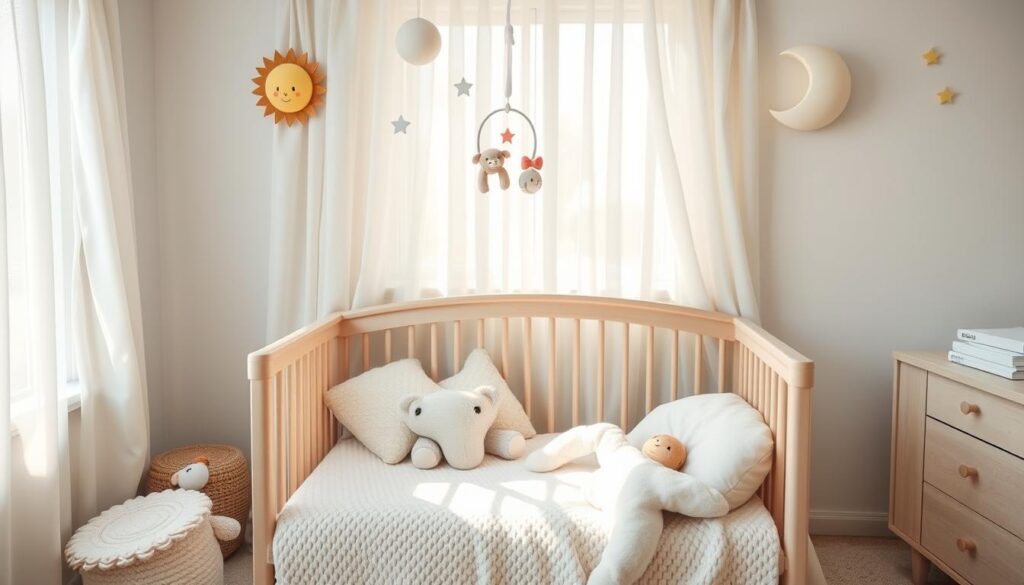
- Encourage active awake time with play and interaction
- Establish a consistent nap schedule
- Expose your baby to natural light during the day
By following these tips, you can help your baby sleep better. Remember, every baby is different. It might take some time to find the right mix of daytime activities for your newborn.
Understanding Sleep Regressions
As a parent, you might find your newborn’s sleep patterns unpredictable and changing. Sleep regressions are common, leading to newborn sleep mistakes. It’s key to focus on fixing newborn sleep issues and finding baby sleep problems solutions.
Research shows sleep regressions can be due to many reasons. These include developmental milestones, changes in routine, and environmental factors. Knowing the causes helps you manage them better. Some common reasons include:
- Developmental milestones, such as teething or learning new skills
- Changes in routine, such as travel or changes in caregivers
- Environmental factors, such as noise or light exposure
To help your baby sleep well during regressions, create a consistent sleep routine. Make sure their room is dark, quiet, and comfortable. Avoid overstimulation and use a calming pre-sleep routine to help them relax.
Understanding and managing sleep regressions is key to your baby’s healthy sleep habits. Stay flexible and adapt to their changing needs. If you’re worried about your baby’s sleep, don’t hesitate to ask for help from healthcare professionals.
| Cause of Sleep Regression | Strategy to Manage |
|---|---|
| Developmental milestones | Provide a consistent sleep routine and environment |
| Changes in routine | Gradually introduce changes to minimize disruption |
| Environmental factors | Create a sleep-conducive environment, such as ensuring darkness and quiet |
Conclusion: Building Healthy Sleep Habits for Life
Teaching newborns good sleep habits is key for their growth and health. Studies prove that babies who sleep well have better brains, emotions, and bodies. By using the tips from this article, you can help your baby sleep well forever.
Every baby is different, so be patient and find what works for you. Bedtime routines, a cozy sleep space, and helping your baby learn to self-soothe are important. With effort and time, your baby will sleep well for years to come.
